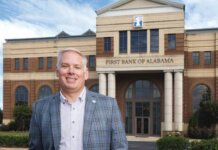
Inflation, job layoffs, threats of tariffs and rising home prices are sources of angst for many American businesses and individuals today.
But in tough economic times, local community banks can be a stabilizing force offering jittery individuals, entrepreneurs and companies more personalized service and financial guidance than the typical regional or national bank.
“When you have a community bank, and you walk in and know everybody in that bank, and you have the cellphone numbers of your loan officer and the executive management, it’s much easier to get assistance versus if you’re just an account number and one of so many that they don’t know who you are, or know your business,” says Will Heaps, president, CEO and co-founder of Merit Bank in Huntsville.
Community banks are independent, locally owned financial institutions and, according to Independent Community Bankers of America, they tend to have strong connections to the towns and cities where their depositors live and work, and they reinvest in those communities.
The American Bankers Association states that community banks help drive the American economy. In fact, the ABA notes that in 2023, lending by community banks totaled $2.31 trillion. They also hold more than 4.5 million small-dollar loans for businesses equaling $325 billion.
One quality community banks are best known for is their heavy emphasis on relationship banking in which bankers strive to get to know their customers over the years and gain insight into each customers’ financial needs, so they can introduce them to products and services based on those needs.
“Community banks are an integral part of Main Street; they reinvest local dollars back into the community and help create local jobs. Their relationship banking philosophy is ingrained in the way they conduct business, one loan — one customer — at a time,” says the ICBA.
In Auburn, David Hedges is president and CEO of AuburnBank, which opened back in 1907.
“We have 118 years in this community and that obviously lends itself to developing lifelong relationships,” Hedges says.
“The people that we bank with are the people we go to church with and spend time on the ball field with. You see them in the grocery store. This is who we live with every day and try to make sure their needs are met and that the community’s needs are met,” Hedges says.
Meanwhile, Jim Dunklin, regional president of First Citizens Bank of Luverne, says that by forming long-term relationships with customers, it gives him a better feel for who is most likely to pay back a loan.
“If you have a history of 30 years with a customer always paying, unless something happens health-wise or something tragic happens, then the relationship is paramount. You have a history of dealing with them.”
Besides lending decisions, one example of personalized attention at a community bank was when Dunklin was CEO of First Lowndes Bank in Lowndes County.
“There were rumors that First Lowndes Bank would probably not make it. So, as CEO, on a weekly basis, I had employees to check the CDs. Back then, the guaranteed amount from the FDIC was up to $250,000,” Dunklin says.
However, one customer had $400,000, he says.
“I didn’t think he had any family members. We tried to contact him, and we ended up finding two sons. They were able to be put on the CDs so in the event the bank failed, he wouldn’t have lost any money,” Dunklin says.
In addition, understanding the local economy and industries impacted by downturns in the economy is also important for making decisions on lending.
Heaps says that in Huntsville, the city has a huge federal government presence.

“If a government contracting company comes in and says, ‘Hey, I’ve got a big contract with the government and I’m going to need some working capital. Can you help me?’ To us, when you have a receivable that’s payable by our U.S. government, that’s about as a good a form of pre-payment for a loan as you could get,” Heaps says.
A bank unfamiliar with the Huntsville area might think the receivables are soft, he says.
“One of the defining factors of banks that are very successful is they understand that that’s a huge component of our local economy, and we’re comfortable with it, whereas some banks that are not community focused, or are new to the market are not going to have that level of understanding and oftentimes might meet it with resistance,” Heaps says.
Besides personalized service, community banks are often freer than regional and national banks to offer flexible repayment plans and other solutions when customers struggle to make payments.
“We need large banks. We need what they provide to larger corporate clients. But I think where community banks make a difference is that our headquarters is right here in Huntsville and we can make decisions based on what’s happening here in our community and not what’s happening on a larger regional or national scale,” Heaps says.
Heaps says when a business or individual first has trouble repaying a loan, the community bank can offer several options for repayment relief or restructuring the loan.
“If it’s a job loss that’s driving it, what are your prospects for new employment? What does your safety net of personal cash look like? And then, once we gather all the facts, we can sit down with that individual customer and come up with a plan that works for the bank and the client,” Heaps says.
In addition to hometown service and tailored solutions, community bank customers can also access personalized counseling and education.
Hedges says he remembers having to calm AuburnBank customers in March 2023 when national headlines announced the collapse of Silicon Valley Bank in Santa Clara, California.

Inadequate risk management, the crash of the tech boom and too many depositors with more than the $250,000 Federal Deposit Insurance limit in SVB led to the bank’s downfall when SVB depositors made a run on the bank all at once.
“Over that weekend, we sent out an email to all of our customers, just reminding them not only of the safety of FDIC insurance, but showing them our strength and stability and the ability to meet their needs,” Hedges says.
“And frankly, with a 118-year history, we have standing. We’ve seen a number of different economic cycles like the Depression, world wars, high inflation and COVID, and have navigated all of that,” Hedges says.
Dunklin says he especially enjoys counseling and educating new business owners on topics such as cash flow and how to reduce their spending.
“What I love to do is to work with the young business owners, young entrepreneurs,” Dunklin says. “I’ve been doing it so long, but I enjoy watching and helping them along the way as they purchase businesses or establish businesses and literally watching them go through the roller coaster of owning your own business.”
“I had one person tell me, ‘You’re not only my banker, you’re also my psychologist.’ I think community bankers tend to feel like we’re heavily vested in the businesses and the lives of those business owners as we walk hand-in-hand with them,” Dunklin says. “That’s what I enjoy the most about being at a small bank.”
Gail Allyn Short is a Birmingham-based freelance contributor to Business Alabama.
This article appears in the May 2025 issue of Business Alabama.



